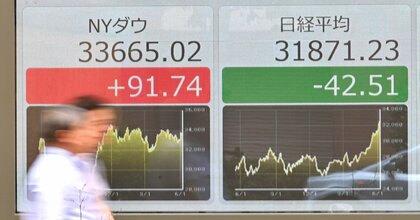Originally published in Japanese on January. 25, 2023
Sustainable Investing in 2024
After falling 14% in 2022, sustainable assets under management grew 6% in the first three quarters of 2023 to $2.7 trillion, according to Morningstar data. Global quarterly flows have so far been positive, driven by Europe, although October has seen outflows across both equities and fixed income. Furthermore, after peaking in the first quarter at 6.3%, the market share of sustainable assets under management has been declining, led by Asia and the U.S.
Performance has been challenging, with sustainable funds having underperformed the broad fund universe by 1.5% in the first three quarters of the year. This has been driven by equity funds, where sustainable funds underperformed the broad fund universe across all main regions (the U.S., Europe and Asia Pacific).
Our quantitative analysis, however, indicates that 2024 could present a highly favorable backdrop for sustainable assets in general, as the defensive profiles of these strategies are well equipped to navigate the challenging environment that is likely to manifest over the coming months.
As we look ahead, we believe ESGQ, JPM’s proprietary sustainable stock selection metric, is likely to perform much better than the overall equity market and typical investment strategies. Our backtesting shows that ESGQ has several defensively-geared aspects: It performs well during the contraction phase of the cycle, it favors falling yields, a rising dollar, falling inflation, falling equity markets, rising volatility and a bull steepening yield curve.-
Our strategy and economics colleagues see many of these conditions playing out over the next few months. The Treasury yield projections of the U.S. rates strategy team imply a bull steepening of 50 basis points. Further, the foreign-exchange strategy team projects the dollar index to rally into the first quarter of the year, before moderating in the second.
Finally, our U.S. economics team expects moderation in both gross domestic product and personal consumption expenditure inflation. These forecasts altogether suggest a slowdown in economic growth and are consistent with J.P. Morgan’s Quantitative Macro Index, which is currently positioned in the contraction phase of the cycle.
Themes of sustainability
We see adaptation to climate change as the new frontier for the alpha generation. The past eight years have been the hottest on record globally, with each year posting temperatures at least 1 degree centigrade above pre-industrial levels. In June 2023, the global mean temperature breached the 1.5 degree threshold of the Paris Agreement for the first time, highlighting the urgency of not just mitigating greenhouse gas emissions, but also the importance of learning to live in and adapt to a warmer planet. Adaptation strategies can help avoid future losses and deliver positive economic returns, as well as social and environmental benefits. Adaptation solutions span multiple sectors: infrastructure, insurance, staples, utilities, technology, and so on, and thus can provide a source of diversification away from traditional climate finance. Furthermore, clarity provided by taxonomies and regulation, together with increased focus at Conference of the Parties (COP), will accelerate investment into adaptation, in our view.
We expect investing in biodiversity to truly pick up over the next few years for several reasons. First, we believe COP 15 will end up representing for biodiversity what the Paris Agreement was to climate change from an investor focus and flows perspective. Second, biodiversity matters for long-term returns, with some models estimating that over half of the world’s GDP depends on nature, and that a partial biodiversity collapse could trim global growth by 2.3% p.a. by 2030. Third, universal owners care, as shown by the number of investor initiatives supporting the integration of natural capital into investment decisions. Fourth, new regulations with real impact on the bottom line, such as the EU deforestation regulation, are emerging.
Policy and regulatory developments
In the EU, we expect a ‘regulatory sprint’ in the first half of 2024, as policymakers attempt to finalize as many policies as possible ahead of the EU Parliamentary elections. After the successful implementation of the “Fit for 55” package to reduce greenhouse gas emissions, the EU’s focus will likely switch in part from creating new sustainability norms to implementing existing ones. Also, recent polls showing a substantial decline in Green party support hint at a potential slowdown of the sustainability agenda under the next Parliament. Several sustainability policies adopted under the EU’s current legislature will come into effect over the next three years, with the reform of the EU emissions trading system and the regulation on alternative fuels infrastructure coming first, followed by the deforestation regulation, the corporate sustainability reporting directive, and regulations on e-fuels at the end of 2024 and early 2025.
The U.S. elections will have a major impact on global climate policy one way or another. Even though 2023 saw some progress on regulatory disclosures with an ambitious bill being passed in California, ESG continues to be a polarizing issue, with a flurry of state-level, anti-ESG legislation making headlines and the Securities and Exchange Commission climate disclosure proposal still delayed. In any case, no event will be more pivotal to U.S. climate policy than the presidential election in November next year, given the opposing views of the Biden administration and most Republican candidates.
Governance improvement in Japan has legs. The triennial revision to the Japanese Corporate Governance Code is due in 2024. We expect recommendations on gender diversity and the disclosure of non-financial information to be added. With the Tokyo Stock Exchange asking Prime and Standard Market-listed companies to target a price-to-book ratio over 1x, we expect companies’ medium-term business plans and dialogue with the market in 2024 and beyond to place a greater emphasis on growth, profitability, sustainability, and better governance, and thus continue to support equity performance.
Tomohiko Sano joined J.P. Morgan’s Equity Research Department in 2015, covering major Japanese machinery companies. He became Co-head of Japan Equity Research in 2022. He has earned a Certificate of CFA Investing in ESG.
Virginia Martin Heriz is the Global Head of ESG Research Methodology and Integration. Prior to her current role Virginia co-managed the JP Morgan Global Macro, Global Macro Opportunities and Global Macro Sustainable funds. The views expressed here are their own.











